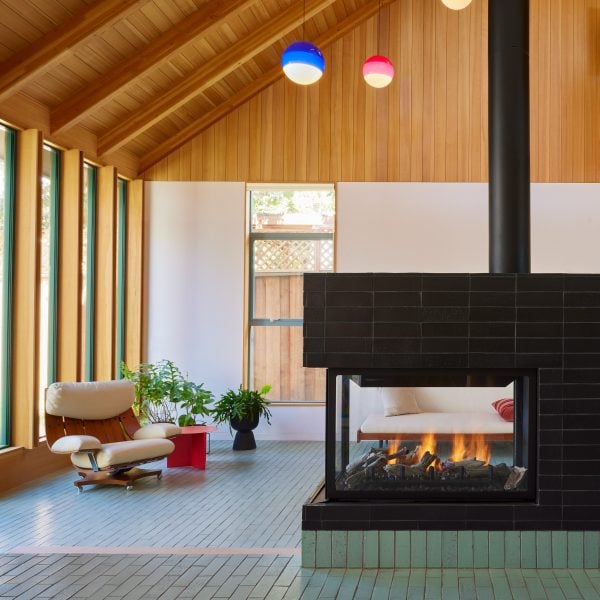[ad_1]
Architecture studio Design, Bitches has completed a southern California home that takes cues from the traditional beach cottage and is meant to be “not too precious”.
The B+B House is located in Venice Beach, a coastal town known for its mix of century-old bungalows and experimental contemporary architecture.
“This specific site is nestled on the edge of the famous ‘walk streets’ of Venice, where small lots are tightly woven together as the city stretches to the Pacific Ocean,” said Catherine Johnson, cofounder of LA studio Design, Bitches.
Built for creative clients, the house replaces a 1914 dwelling that had fallen into disrepair. A key design goal was to ensure the new home aligned with the character of the original house and the area’s bungalows.
For a slender lot sandwiched between houses, the architects conceived a main dwelling and detached guesthouse in the rear.
A small yard serves as a “dynamic connection” between the two buildings, while also providing views of the sky and surrounding palm trees.
Rising two levels, the main dwelling is roughly rectangular in plan and is topped with a gabled, standing-seam-metal roof. Inserted into the upper portion is a shoebox-shaped bar that reaches toward the guest house.
The two-storey guest house has a square plan. The upper level is carved away to form an outdoor terrace.
“By maintaining the integrity and proportion of the traditional Venice Beach bungalow and adding a bar slid through it, the B+B house makes an argument for the resilience of archetypes – playing out juxtaposition in a small house that speaks to both modernist volumes and ways of life,” the studio said.
Both buildings are clad in raked stucco and non-oiled, thermally modified ash that will turn grey over time. The guest house also features board-formed concrete.
Interior layouts are meant to be flexible per the family’s lifestyle.
“The house was built for a small, creative family that works in various ways and has a constant flux of extended family and friends that flows in and out of town on a regular basis,” the studio said.
In the main house, the ground level encompasses a living room, dining area, kitchen, bathroom and bedroom.
The upper level holds the primary bedroom and bathroom, along with a loft-style room that has openings to both the bedroom and living room below. The loft can be used as a music or sleeping area.
“The flexible loft bridges the boundaries between gathering and retreat,” the team said.
“Interior windows were punched through upstairs volumes so both cross breezes and conversations continue and flow from upstairs down to the main living areas,” it added.
The guest house contains a flexible, ground-level space that serves as a studio, recreation space and garage. Upstairs is a bedroom and studio as well as a small bathroom.
Finishes and decor are meant to feel livable.
“The house feels instantly comfortable, welcoming to all and not too precious to use,” the studio said.
To add warmth, the team used vertical-grain hemlock for walls and ceilings.
For the floors in the communal area, Johnson and her team specified a thin, glazed brick in a turquoise shade that evokes the tiles found in the São Paulo home of Brazilian architect Lina Bo Bardi.
The same tile, but in matte black, was used for the fireplace cladding. Hanging lighting fixtures in both the kitchen and living area are by the Spanish company Marset.
The kitchen cabinetry is made of black oak and dark blue laminate. Countertops are made of a composite product called PaperStone.
To help minimise energy consumption, the team installed skylights, solar hot water and radiant floors.
Elements at all levels – from massing to interior details – were carefully thought out while designing the home.
“Proportion and scale were carefully considered, from larger formal intersections down to the varying details and directionality of material texture, pattern and rhythms,” said Johnson.
Other projects by Design, Bitches include a Nashville restaurant that evokes “old-school Miami” and an eclectic eatery and video arcade in Los Angeles that takes cues from Postmodernism and film noir.
The photography is by Yoshihiro Makino.
[ad_2]

